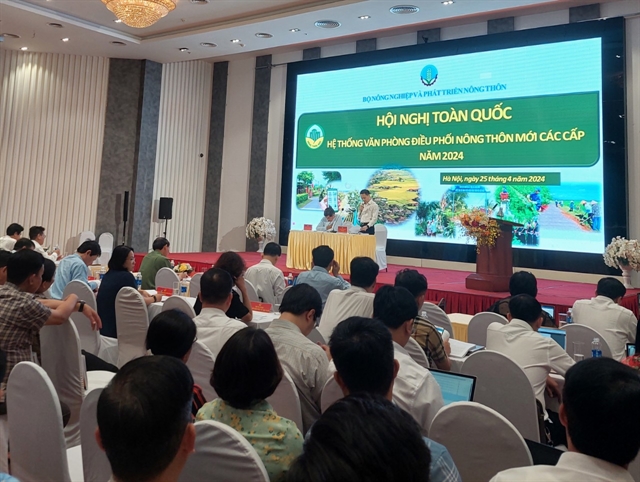 Politics & Law
Politics & Law

 |
| National Conference of Co-ordinating Office for New Rural Development at all levels held in Hà Nội on Thursday by the Ministry of Agriculture and Rural Development. — VNS Photo Tố Như |
HÀ NỘI — The One Commune One Product Programme (OCOP) has taken significant steps in development, contributing to awakening the potential, advantages, and indigenous values of regions and localities in recent years," said Ngô Trường Sơn, chief of the Central Coordinating Office for New Rural Development.
The programme has also fostered creative and innovative thinking, conveying traditional cultural values and the soul of the nation in each product, and contributing to promoting rural economic development in the direction of "multi-value integration", Sơn said at the National Conference of Coordinating Offices for New Rural Development at all levels held in Hà Nội on Thursday by the Ministry of Agriculture and Rural Development.
Currently, the whole country has more than 12,000 OCOP products achieving 3 stars or higher, with over 6,500 OCOP producers and about 78 per cent of communes meeting new rural standards, an increase of nearly five per cent compared to the end of 2022. Of these, more than 1,800 communes met advanced new rural standards, marking an increase of nearly 900 communes compared to the end of 2022, and 340 communes were recognised as model new countryside, an increase of nearly 230 communes.
Sơn emphasised that as OCOP products have increased rapidly in quantity in recent years, attention is needed to address several raised issues to improve quality in all aspects, ensuring sustainable development and truly promoting the potentials and advantages of localities and regions associated with preserving and promoting traditional cultural values and rural economic development.
Along with enhancing OCOP, the agricultural sector also focuses on rural tourism development.
To date, the Ministry of Agriculture and Rural Development has approved 20 models of agricultural and rural tourism associated with agricultural production, craft villages, preserving cultural values, and protecting environmental and rural landscapes in 20 provinces.
The conference served as a platform for participants to propose tasks and solutions to continue to maintain and improve the quality of the new rural development programme.
Speaking at the conference, Trần Thanh Nam, Deputy Minister of Agriculture and Rural Development, a member of the Central Steering Committee for National Target Programs for the period 2021-2025, said that the remaining time of the period 2021-2025 was not much, while the number of goals and tasks that needed to be completed was very large. “Therefore, in 2024 - the year of acceleration, we need to carry out more drastic and effective solutions,” Nam said.
“We affirm that the National Target Programme on Building New Rural Areas continues to be the goal and driving force for socio-economic development in rural areas to improve the quality of life, material and spiritual life of rural people and step by step build ‘Ecological Agriculture, Modern Countryside, Civilised Farmers’,” said the deputy minister.
According to the deputy minister, with the goal of further improving the quality of material and spiritual life of rural people, the National Assembly and the Government have approved the National Target Programme on Building New Rural Areas for the period 2021-2025.
After 3 years of implementation, the programme has continued to achieve important results creating significant changes with further investment into socio-economic infrastructure helping improve the rural environment and people’s lives.
By April this year, a series of policies, mechanisms, and documents guiding the implementation of the programme has been issued and fully adjusted, ensuring unity, synchronisation, and suitability better with the actual conditions of regions, which will basically remove difficulties and obstacles and create more favourable conditions for localities. — VNS




